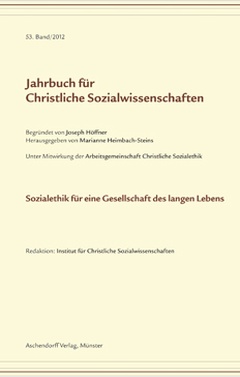Spatial turn in der christlichen Sozialethik. Ein Plädoyer
Schlagworte:
Sozialethik, Sozialpolitik, RaumentwicklungAbstract
Zusammenfassung
In der Sozialethik ist das Soziale bisher weitgehend unter Absehung des Räumlichen gedacht worden. Die Rezeption des spatial turn eröffnet die Chance, diese Lücke zu schließen. Die Wende ist zum einen mit der Aufforderung verbunden, die Aufmerksamkeit für raumbezogene Fragen zu erhöhen. Dies macht nur Sinn auf der Basis eines handlungsorientierten Raumbegriffs. Nur wenn Räume auf menschliches Handeln zurückgehen, können an ihre Gestaltung normative Kriterien angelegt werden. Zum anderen kann der spatial turn den Stellenwert einer richtigen Kehre annehmen. Dies ist dann der Fall, wenn von der Materialität des Raumes abstrahiert wird und räumlich-relationale Denkmodelle in den Mittelpunkt gestellt werden. In dieser Perspektive geht es nicht mehr nur darum, über konkrete Raumverhältnisse nachzudenken und zu reflektieren, sondern das Denken selbst wird raumbezogen und relational. Ein derartiger turn hat Konsequenzen für den sozialethischen Ansatz. Dies gilt für die sozialwissenschaftliche Analyse, es gilt aber auch für die sozialen Ordnungsmodelle und die anthropologischen Grundlagen, auf die man sich bezieht.
Abstract
So far, in the field of Christian social ethics social and societal questions have been discussed without considering the dimension of space. The ›spatial turn‹ now offers the opportunity to close that gap. On the one hand, the spatial turn demands a higher attention to questions related to space. This, however, only makes sense on the basis of an action-oriented concept of space. Only space connected to human activity can be subject to normative criteria. On the other hand, the spatial turn has the potential to initiate a veritable turning point. This is the case if spatial materiality is abstracted into spatial-relational concepts. In this context, not only will concrete material space claim theoretical consideration, but thinking itself will become spatial and relational. This kind of turn will have significant consequences for the socio-ethical approach. This is not only true for socio-scientific analysis, but also for the underpinning models of social order and anthropological theories.

